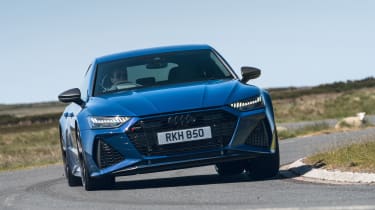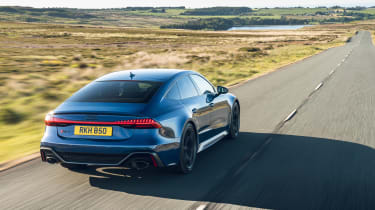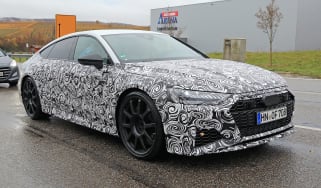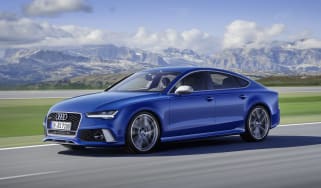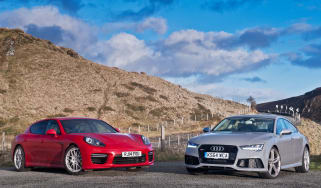Audi RS7 Sportback Performance review – the ultimate all-weather superhatch?
Faster, sharper and more involving than before, the RS7 Performance is a true force of nature
The second-generation RS7 has always been something of a dark horse; a deeply talented supersaloon (or hatchback, technically speaking...) which proves that big, fast Audis needn't be dull to drive. Having spent a few months with one on evo's Fast Fleet, we really enjoyed its shockingly urgent performance, sky-high quality and the way it seemed to suck up poor road surfaces with no fuss at all to deliver a sense of unstoppable, irresistible omnipotence. Later, we discovered it still tended towards understeer on track and its easy sense of control started to finally unravel, but for the most part the RS7 charmed and impressed.
Now, to add extra drama, noise and performance, Audi has updated the RS7 with a new Performance derivative. It replaces the standard model in the UK and brings extra bite to the RS7's fiendishly advanced chassis, which includes active differentials and clever hydraulically cross-linked dampers. Naturally, the Performance treatment squeezes even more power from the 4-litre twin-turbo V8, too.
As before, the RS7 gets a bespoke body to separate it from the standard A7, while also acting as a clear statement of intent that this is no half-hearted executive express. With BMW’s M8 Competition Gran Coupe and AMG’s GT63 S 4-Door on its heels, the RS7 is up against seriously potent rivals, and that’s before you take into consideration its in-house nemesis from Porsche.
Audi RS7 Sportback: in detail
- Engine, gearbox and technical highlights > Ostensibly the engine and transmission are not dissimilar to those of the RS7 that came before, or indeed its key rivals
- Performance and 0-60 time > With a boost to 621bhp, the RS7 Performance is in the ballpark of rivals like the M8 Gran Coupe
- Ride and handling > Doesn’t drive like the Porsche, BMW or Mercedes, but it does have a balance and feel all of its own
- MPG and running costs > Thanks to a raft of fuel-saving tech, drive gently and it’s more efficient than you might imagine
- Interior and tech > The RS7 is laden with tech and feels beautifully built, even if the cabin design is a little unimaginative
- Design > Less pure than the previous RS7, but also more muscular. With its pumped, bespoke body this is one aggressive and intimidating car to look at
- Long term test > We ran a second-generation RS7 on evo's Fast Fleet in 2020, and it left a lasting impression as an extremely fast do-everything family performance car
Prices, specs and rivals
The RS7 Sportback is available in three forms in the UK, each in Performance spec. The base car certainly isn't cheap at £115,225, but then it is fully loaded from the outset, with 22-inch wheels, laser-assisted matrix LED headlights and all the other usual high-end German-car fodder. In terms of performance hardware, standard RS7s ride on adaptive air suspension as standard, with Audi’s Sport Differential also included.
Spend £124,175 on the Carbon Black and the upgrades are mostly aesthetic, with carbon inlays, grey detailing inside and matte black styling accents. For the full experience, the £132,625 Carbon Vorsprung adds to this some high-end options such as a panoramic sunroof and Audi's Dynamic Ride Control DRC suspension system, which we’ll elaborate on later.
Despite the six-figure base price, the RS7 isn't the most expensive model in its class. BMW’s M8 Competition Gran Coupe starts at £135,590, has slightly more power, and is the ultimately the faster car, but it’ll cost you a further £19,950 to specify the Ultimate Pack, which bundles lots of what you do need, such as active roll stabilisation, and lots of what you don’t, like powered rear sunblinds – on a car with frameless doors.
The soon to be updated Panamera Turbo S is even more expensive at £141,400. It's similarly powerful to the RS7, but reaches 62mph a few tenths quicker and brings excellent comfort and build quality to the table.

